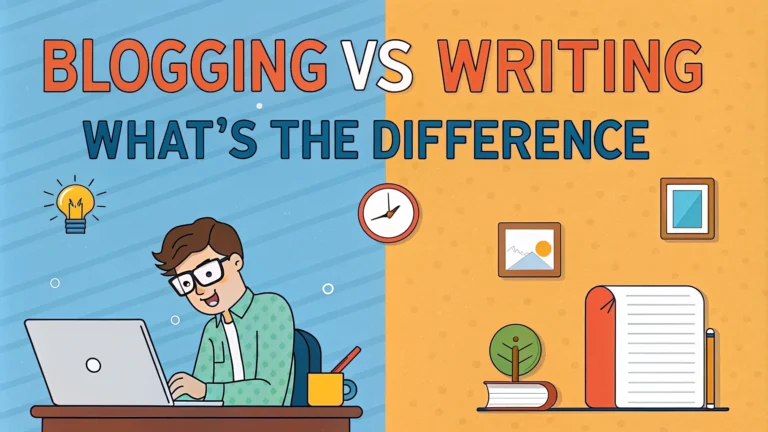Many people mix up blogging and writing, but they serve different purposes and require unique approaches. **Blogging** focuses on engaging online audiences through conversational content, while **traditional writing** often follows more formal structures and rules.
Each format needs specific skills and strategies to connect with readers effectively. This quick guide breaks down the key differences to help you choose the right approach for your goals.
Core Differences Between Blogging and Writing
* **Style and Tone**: Blogs use casual, conversational language; traditional writing tends to be more formal
* **Structure**: Blogs feature scannable content with shorter paragraphs and bullet points; traditional writing uses longer paragraphs
* **Purpose**: Blogs aim to engage and interact; traditional writing focuses on informing or storytelling
* **Format**: Blogs include multimedia elements; traditional writing relies primarily on text
Essential Elements of Successful Blogging
* **SEO optimization**
* **Strategic headings and subheadings**
* **Internal and external links**
* **Engaging meta descriptions**
* **Visual content integration**
* **Comment sections**
Key Components of Traditional Writing
| Component | Purpose |
|---|---|
| Grammar Rules | Maintains professional standards |
| Literary Devices | Enhances storytelling |
| Structured Format | Ensures logical flow |
| Citations | Supports credibility |
> “Blogging is a conversation, while traditional writing is a presentation. Each serves its own unique purpose in the world of content creation.”
Best Tools for Modern Bloggers
* **Grammar Checkers**: Grammarly, ProWritingAid
* **SEO Tools**: Yoast SEO, RankMath, Ahrefs
* **Content Research**: BuzzSumo, AnswerThePublic
* **Image Editors**: Canva, Adobe Express
* **Analytics**: Google Analytics, MonsterInsights
Content Distribution Strategies
Building an audience requires smart distribution across multiple channels:
* **Social Media Scheduling**: Buffer, Hootsuite
* **Email Marketing**: ConvertKit, MailChimp
* **Content Repurposing**: Turn blog posts into videos, infographics, or podcasts
* **Cross-posting**: Share on Medium, LinkedIn, or industry platforms
Measuring Blog Performance
Track these key metrics to improve your content:
| Metric | What It Shows |
|---|---|
| Page Views | Overall traffic volume |
| Time on Page | Content engagement level |
| Bounce Rate | Content relevance |
| Conversion Rate | Action completion |
Next Steps for Growth
Take these actions to improve your blog:
1. **Set clear goals** for your content
2. **Create an editorial calendar** to maintain consistency
3. **Build an email list** from day one
4. **Network** with other bloggers in your niche
5. **Monitor analytics** to understand what works
> “Success in blogging comes from consistently creating value for your readers while staying true to your unique voice.”
Remember to:
* Update old content regularly
* Respond to reader comments
* Test different content types
* Focus on quality over quantity
FAQs About Blogging vs Writing
Q: What’s the main difference between blogging and traditional writing?
Blogging is typically more conversational and informal, focusing on personal experiences and real-time engagement. Traditional writing follows stricter formats and often requires formal tone, especially in academic or professional contexts.
Q: Do bloggers make more money than traditional writers?
Income varies greatly in both fields. Successful bloggers can earn through:
- Affiliate marketing
- Advertising revenue
- Sponsored content
- Digital products
Traditional writers typically earn through:
- Book royalties
- Publication fees
- Freelance assignments
- Content writing contracts
Q: How often should blog posts be published compared to traditional articles?
Blog posts are typically published 1-4 times per week to maintain audience engagement. Traditional articles may have longer intervals between publications, often monthly or quarterly.
Q: What’s the ideal word count for blog posts vs traditional articles?
| Content Type | Typical Word Count |
|---|---|
| Blog Posts | 500-2,500 words |
| Traditional Articles | 2,000-5,000 words |
Q: Is SEO important for traditional writing like it is for blogging?
SEO is crucial for blogging and digital content but less important for traditional print writing. However, even traditional writers now consider SEO for online publications.
Q: What skills are needed for successful blogging vs traditional writing?
Bloggers need:
- Digital marketing knowledge
- SEO understanding
- Social media skills
- Basic web design knowledge
Traditional writers need:
- Strong grammar fundamentals
- Research skills
- Advanced editing abilities
- Genre expertise
Q: Can blog posts be converted into traditional writing formats?
Yes, blog posts can be adapted into books, articles, or academic papers with proper restructuring and formatting adjustments.
Q: What editing requirements exist for blogs vs traditional writing?
Traditional writing requires extensive editing and multiple revisions. Blog posts often need quick edits focusing on clarity and SEO optimization.
Q: How does audience engagement differ between blogging and traditional writing?
Blogging allows immediate interaction through comments and social sharing. Traditional writing typically has delayed or limited reader feedback channels.
Q: What are the publishing timelines for blogs vs traditional writing?
Blog posts can be published immediately after writing. Traditional writing often requires weeks or months of editing, review, and publishing processes.
Q: How do you measure success in blogging vs traditional writing?
Blogging success metrics include:
- Page views
- Engagement rates
- Social shares
- Conversion rates
Traditional writing success metrics include:
- Sales numbers
- Critical reviews
- Industry recognition
- Publisher feedback



















